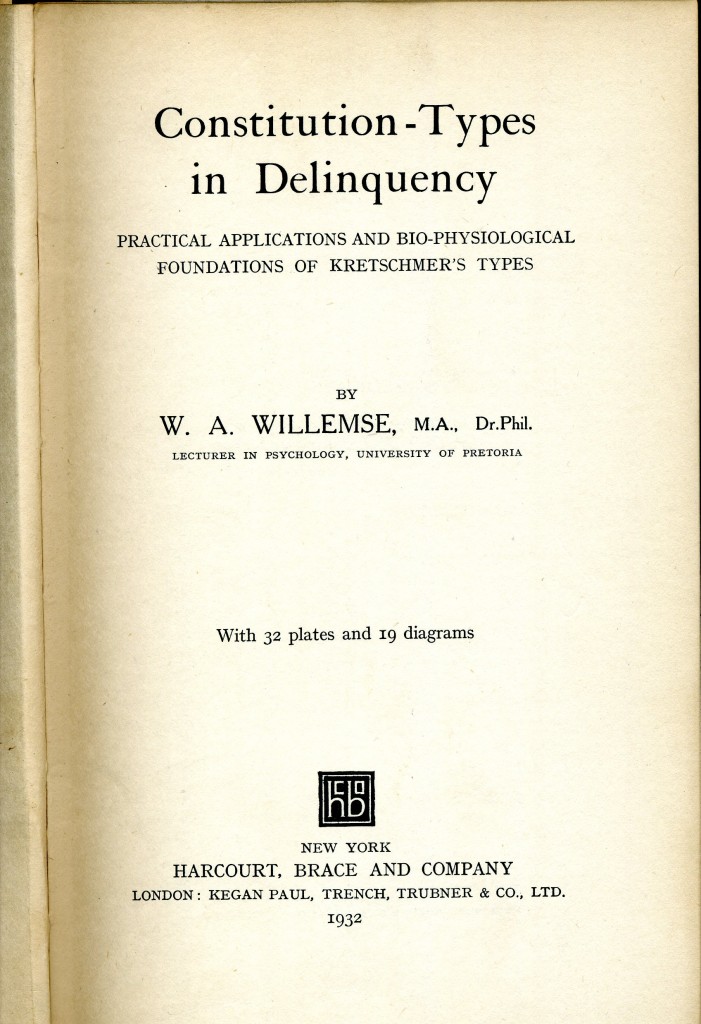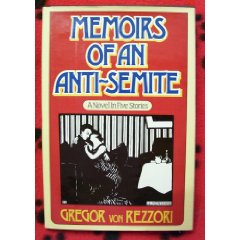part one:
While apprenticing to a diminutive giant of piano rebuilding in the early 1980s, my master ordered me to rush over and see “an elderly ledy on ze Fist Avenue (his Polish accent never mastered ‘th’) and see abaht her instrooment.’ Eyeing me afterwards, the retired Italian opera vocal coach asked if I ever read books and handed over a heavy bag, sending me on my way. Peeking inside, they were rather irrelevant but one title stopped me cold:
Never contented by the routine task of premeditated book selection, serendipity often played an influential role in developing me along with my reading. Dressed in scientific analyses was a police blotter text on how physical types tended to be criminal, supported by lurid case histories and shocking photos undertaken during the author’s research in his native South Africa, soon before their Boers sided with Hitler and later established apartheid. Several record collectors at large resembled this Leptosome genus
An even more pungent image came in the Pyknic category (seen below). Variations of a combined “Leptosome with Pyknic tendencies having a neurasthenic strain” led to visions of creating a ballet, projecting their photos on a screen as certain sounds, recited case-histories, and appropriate postures and motions would unite in line with their melange of subcategories, a Firebird cast of Pyknic-Athletic Arsonists.
The Pyknic on the right typically exhibits Dr. Willemse’s diagrams and head measurements defining a “gang-leader physique”. The ballet’s staging matured in my mind but no music that could properly represent them in sound was forthcoming. And at the same time, an urgency to grasp the history surrounding the forgotten and enigmatic pianist Ignaz Friedman seized me and put composing to rest.
A friend had just returned from an unexpected stopover in Romania, due to a severe scheduling problem with Tarom, their shaky national airline. Bucharest was being savaged to demolish architectural glories, resurrected into Balkanized pseudo-Pyongyang structures. Repression was at a high under their dictator, who instituted a cult of personality. My composer friend remarked on a specific brand of cigarettes that had become a fetish and status symbol, substituting for valuta (foreign currency), an open-sesame leading to contraband and palm baksheesh.
Soon after learning about this unreported chaos and despair, I stumbled upon a remote bakery in Sunnyside, Queens. Nita’s oddly boasted of their status as a European bakery rather than lording over any French or Italian accomplishments. Inside hung a list of cardboard strips offering claitite and carpati. These Romanian delicacies brought forth a gasp and lit a flame: “Is there an authentic Romanian restaurant nearby?” “Yes, around the corner: Capsa.”
Days later I dragged two Americans and a visiting French pianiste along to investigate this rarity. No one spoke English inside, but my Italian was immediately intercepted by a doting waiter. As he led us into their mythic canopied back garden, we noted a pack of Kent 100s garishly placed on the corner edges of every table as diners suspiciously eyed us in passing. Wine had been especially brought over for their restaurant, only for them, insisted our waiter. Everything was overtly delicious and ridiculously underpriced on the menu. “Try out mitiei, garlic sausages, on the house!” A few arrived and we were smitten, ordering one portion: a platter with twenty arrived. The ciorba de perisoare meatball soup was laced with lovage and shreds of sour cabbage, another “on the house” offering, also arriving in exponential amounts by the eager waiter. A second bottle of Muscat Ottonel from Murfatlar transported us with a Biblically intense fruit-of-the-vine experience into voluptuous pastries imported from Nita’s. Smoke choked the room as an accordionist belted out crooked Balkan rhythms amidst song and whistling.
The bill arrived and we were over $60 short. After leaving to bail us out, I was told the waiter came by every five minutes, urging the trio to “have a bite while you’re waiting for him.” Once back, our server begged me, in confidence, to approach a grim, angry fellow vigorously engaged in chatting with a seated couple: “Tell him that I am the BEST WAITER IN AMERICA!” I obliged in a formal manner and derisive laughter and snickering erupted throughout the room. The waiter, ushering us out, advised all, “Come back soon!” while whispering to me “next time, bring more money.”
I had to unlock the secrets of Capsa, as it was among the finest food I had ever encountered and a kaleidoscope of reality and illusion. A week later, alone, I returned right before dinnertime. The owner handed me Capsa’s business card which listed him in a byline as “Constantin Udroica, president.” (a.k.a ‘President-for-Life’.) A fistfight suddenly broke out in their basement kitchen and as the only customer, the Prez warned between the screaming and shattering plates, “You look too much.”
A few weeks later a book’s title stopped me in my tracks.
From the first word, ‘Skushno” (Russian, for ‘boredom’), I was drawn into an Austro-Hungarian and Romanian world that overshadowed any writer’s block or need to be a composer, unexpectedly dissipating the fog of Ignaz Friedman’s lost origins.
I soon headed to Denmark in 1984, where Friedman sat out World War I, finding a violinist colleague of his from 1912 and documentation. Amidst this trove, I reached the final page of Gregor von Rezzori’s Memoirs and put it down feeling utterly enlightened, and crestfallen, nearing a precipice. Rezzori had decoded a Europe vaguely hinted at by relatives, acquaintances, musicians who had fled, and moreover, the most vivid depiction of Jewish life in Eastern and Central European cities, pellucidly recited in prose by a non-Jewish writer who lived through the inter-war decades.

I had to find him.
A clue came on the blurb: the author lived in Toscana. Off at once to the Copenhagen central phone building where I retrieved a foot-high stack of Tuscan phone directories. After an hour of searching town by town, his name appeared. I rang him at once:
“I just finsihed reading your Memoirs, loved them. I’m a Jew. Can we talk about Ignaz Friedman, a pianist I’m researching, who came from your old empire? I’ll be in Italy soon.”
“Come on over my boy! Would be glad to meet you.”
(to be continued)






Politically incorrect!
Love it! Want to hear about the meeting.
https://arbiterrecords.org/confusion-untangled-by-affinity-2/